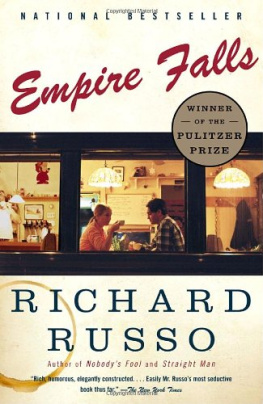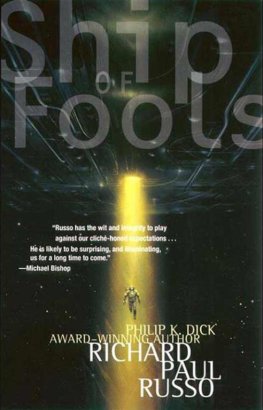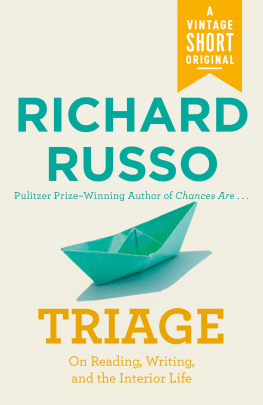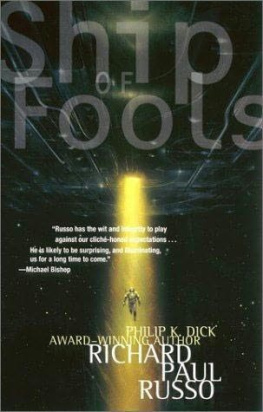Richard Russo
Everybody's Fool
HILLDALE CEMETERY IN North Bath was cleaved right down the middle, its Hill and Dale sections divided by a two-lane macadam road, originally a colonial cart path. Death was not a thing unknown to the towns first hearty residents, but they seemed to have badly misjudged how much of it thered be, how much ground would be needed to accommodate those lost to harsh winters, violent encounters with savages and all manner of illness. Or was it life, their own fecundity, theyd miscalculated? Ironically, it amounted to the same thing. The plot of land set aside on the outskirts of town became crowded, then overcrowded, then chock-full, until finally the dead broke containment, spilling across the now-paved road onto the barren flats and reaching as far as the new highway spur that led to the interstate. Where theyd head next was anybodys guess.
Though blighted by Dutch elm disease in the 70s and more recently by a mold that attacked tree roots, causing them to weaken and constrict and allowing the ground, without warning, to collapse in pits, the original Hill section was still lovely, its mature plantings offering visitors shade and cool breezes. The gentle, rolling terrain and meandering gravel pathways felt natural and comfortable, even giving the impression that those resting beneath its picturesque hummocks some interred before the Revolutionary War had come there by choice rather than necessity. They seemed not so much deceased as peacefully drowsing beneath tilting headstones that resembled weathered comfy hats worn at rakish angles. Given the choice of waking into a world even more full of travail than the version they left, who could blame them for punching the snooze button and returning to their slumbers for another quarter century or so?
By contrast, the newer Dale was as flat as a Formica tabletop and every bit as aesthetically pleasing. Its paved pathways were laid out on a grid, the more contemporary grave sites baked and raw looking, its lawn, especially the stretch nearest the highway, a quilt of sickly yellows and fecal browns. The adjacent acreage, where the Ultimate Escape Fun Park had once been pictured, was boggy and foul. Lately, during periods of prolonged rain, its pestilential groundwater tunneled under the road, loosening the soil and tugging downhill the caskets of those most recently interred. After a good noreaster there was no guarantee that the grave site you visited featured the same casket as the week before. To many the whole thing defied logic. With all that seeping water, the Dale should have been richly verdant, whereas everything planted there shriveled and died, as if in sympathy with its permanent, if shifty, inhabitants. There had to be contamination involved, people said. All those putrid acres had been used as an unofficial dump for as long as anybody could remember, which was why theyd been purchased so cheaply by the fun parks planners. Recently, during a prolonged drought, dozens of leaking metal drums decorated with skulls and crossbones had surfaced. Some were old and rusty, leaking God-only-knew-what; other newcomers were labeled chrome, which cast a pall of suspicion on neighboring Mohawk, a town once rich in tanneries, but these accusations were emphatically and for the most part convincingly denied. Anybody wanting to know what those tanneries did with their dyes and carcinogenic chemicals only had to visit the local landfill, the stream that ran through town or the hospitals oncology ward. Still, didnt the drums of toxic slurry have to come from somewhere? Downstate most likely. On this point the history of New York was unambiguous. Shit both liquid and solid, literal and metaphorical ran uphill in defiance of physics, often into the Catskills, at times all the way to the Adirondacks.
No jaunty, charming grave markers in Dale. Here the stones were laid purposefully flat so they couldnt be tipped over by teenage hooligans. Baths legendary eighth-grade English teacher, Beryl Peoples, whose dim view of human nature she occasionally shared in acerbic letters to the North Bath Weekly Journal, had warned what would happen. With all the stones lying flat, she cautioned, and without any trees or hedgerows to provide an obstacle, visitors would treat the cemetery like a supermarket parking lot and drive directly to whatever grave they had in mind. This warning had been dismissed as perverse and outrageous, a slander on the citizenry, but the old woman had been vindicated. Not a week went by without someone calling the police station to report tire tracks across Grandmas headstone, right where her survivors imagined her upturned, beatific face to be. Howd you like it if somebody drove a pickup over your skull? the angry caller would want to know.
Chief of Police Douglas Raymer, arriving at Hilldale late to witness the interment of Judge Barton Flatt, was always at a loss how to respond to such queries, which seemed to him so fundamentally flawed that you couldnt even tell if they were real questions. Were people inviting him to draw the obvious distinction between driving an automobile over an ancestors grave an insensitive, inconsiderate act, sure and driving it over a living persons head, obviously a homicidal and criminal one? How was it helpful for him to imagine what either felt like? It was as if people expected him to make sense of both the physical world and its miscreants, the latter too numerous to count, too various to explicate, the former too deeply mysterious to fathom. When had either become part of the police chiefs job description? Wasnt explaining the worlds riddles and humans behaviors what philosophers and psychiatrists and priests were paid to do? Most of the time Raymer had no idea why he himself did what he did, never mind other people.
Whatever his job was, most days and today was certainly no exception it sucked. As a patrolman hed imagined that, as chief, his hours would be filled with genuine police work, or at least real public service, but after two terms he now knew better. Of course in North Bath most crimes didnt demand much detective work. A woman would turn up at the hospital looking like somebodyd beaten the shit out of her, claiming she tripped over her childs toy. When you visited her husband and offered to shake, the hand he reluctantly extended looked more like a monstrous fruit, purple and swollen, the skin splitting and oozing interior juices. But even such dispiritingly mundane investigations were fascinating compared with Raymers current duties as chief of police. When he wasnt attending the funerals of people he didnt even like or addressing groups of concerned citizens who seemed less interested in any solutions he might propose than how much churlish invective he could be forced to swallow, he was a glorified clerk, a mere functionary who spent his time filling out forms, reporting to selectmen, going over budgets. Some days he never got out from behind his desk. He was getting fat. Also, the pay really sucked. Okay, sure, he made more than he had as a patrolman, but not enough more to cover the endless aggravation. He supposed he could live with the fact that the job sucked if he was any good at it, but the truth was that he sucked. He had no idea what hed have done without Charice speaking of aggravation and her incessant badgering. Because she was right, he was increasingly forgetful and unfocused and preoccupied. Since Becka
But no, he wasnt going to think about her. He would not. He would concentrate on the here and now.
Which was hot as Uganda. By the time Raymer crossed the cemetery parking lot and walked the hundred or so yards to where a couple dozen mourners were clustered around Judge Flatts open grave, he was drenched in sweat. Such punishing heat was unheard of in May. Here in the foothills of the Adirondacks, Memorial Day weekend, the unofficial beginning of summer, was almost always profoundly disappointing to the regions winter-ravaged populace, who seemed to believe they could will summer into being. They








